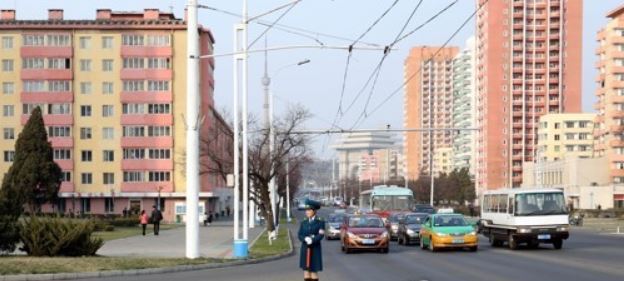Traffic accidents in N. Korea appear to have increased since Kim Jong-un took power: research team
By YonhapPublished : March 21, 2018 - 10:47
Traffic accidents in North Korea appear to have increased since leader Kim Jong-un took power, a South Korean research team said Wednesday, citing increased reports about overseas traffic accidents in state media and warnings of punishment for traffic violators.
The Kangwon National University research team gave the analysis in a report commissioned by the Road Traffic Authority after scrutinizing reports in North Korea's state media outlets, such as the Rodong Sinmun newspaper and the Minju Choson newspaper, from 1945 to 2016.

According to the research team, state media frequently carried reports about traffic accidents in South Korea, the United States, Japan and other nations between 2012 and 2015. Leader Kim Jong-un assumed power after his father Kim Jong-il died in late 2011.
Considering these state media outlets do not carry negative stories about the country, the increase in reports about foreign traffic accidents suggests the problem of traffic accidents in the North has worsened, the research team said.
In another sign of the growing seriousness of traffic accidents in the country, the communist regime also issued nationwide decrees in 2013 and 2015 warning of stern punishment for traffic violators, according to the research team.
In the 2013 decree, the regime picked drunk driving, driving without a license and hit-and-run as representative traffic violations, and warned perpetrators of fines, suspension of drivers' licenses and even seizure of vehicles, the research report showed.
The 2015 decree even portrayed traffic violations as a "poisonous act" that impedes the regime's efforts to build a "great socialist economic power" and as an act that benefits enemies trying to isolate and stifle the regime, according to the report.
"When we look at the two decrees, we can assume that traffic in North Korea became heavier and accidents happened frequently," the research team said. "The repeated reports about foreign traffic accidents appear to be an attempt to prevent increased traffic accidents leading to negative perceptions about the regime."
Drunk driving and reckless driving are believed to be the main reasons for the increase in the North's traffic accidents in a nation where driving itself is considered a privilege and a demonstration of one's power, the research team said. (Yonhap)






![[From the Scene] Monks, Buddhists hail return of remains of Buddhas](http://res.heraldm.com/phpwas/restmb_idxmake.php?idx=644&simg=/content/image/2024/04/19/20240419050617_0.jpg&u=20240419175937)








![[From the Scene] Monks, Buddhists hail return of remains of Buddhas](http://res.heraldm.com/phpwas/restmb_idxmake.php?idx=652&simg=/content/image/2024/04/19/20240419050617_0.jpg&u=20240419175937)

![[KH Explains] Hyundai's full hybrid edge to pay off amid slow transition to pure EVs](http://res.heraldm.com/phpwas/restmb_idxmake.php?idx=652&simg=/content/image/2024/04/18/20240418050645_0.jpg&u=20240419100350)

![[Today’s K-pop] Illit drops debut single remix](http://res.heraldm.com/phpwas/restmb_idxmake.php?idx=642&simg=/content/image/2024/04/19/20240419050612_0.jpg&u=)